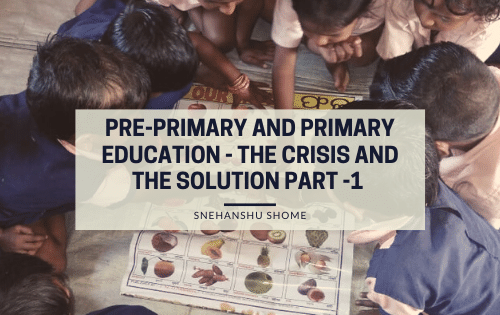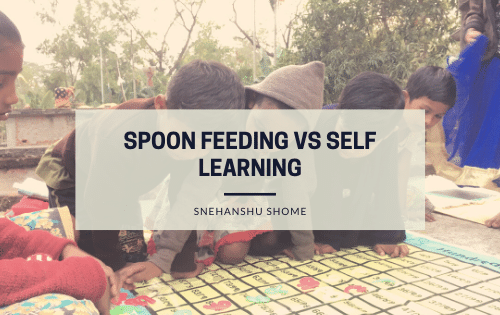Pre-Primary Education is one not so talked about topics in the country. Even though it should be on primary focus right now. As the NEP states with evidence that 85% of child’s cumulative development happens before the age of six. The Integrated Child Development Service and under it the Anganwadi scheme has played a major role in improving the health status in the rural hinterland but nothing concrete has yet been set up for the curriculum or for monitoring the learning outcomes.
The curriculum for the pre-primary education as seen in other countries or in some private schools covers four major skills Physical, Language, Memory and Social Skills. These our some basic skills that needs to be implemented and worked upon for every kid before they enter the primary grades. The Primary grade consisting of classes 1 to 5 are predominantly along the same lines in the curriculum. In india, the state and central boards have guidelines for these classes which is based on a syllabus with various tests year round. For kids who have not been a part of any pre school activity before this, it is very dangerous to push them into a system which does not gives them a space to understand it.
ThinkZone is one among few social enterprises working in the primary education sector. Been associated with ThinkZone for over a year, I had the opportunity to meet a lot of kids and teachers at their learning centers in the villages. These learning centers run on an after-school, level-based model, i.e. the centers run after school by trained women of the community while the kids sit according to their levels instead of classes. These levels are decided by a baseline test conducted to judge their basic competencies for each level according to the state defined curriculum. During the baseline activity we went to a number of villages and we did these tests for over a hundred or more students. The results were in line with the average observation. Kids in Class 5 couldn’t comprehend two digit addition or subtraction, they could read simple English sentences but they could not explain or understand the meanings of those. Across India, less than 45% of children in Grade 5 are of Grade 2 or less while 25 Million students fail to cope up with their classes and suffer from severe learning deficiencies.
The ThinkZone solution works is in two phases – remedy and prevention. Early Childhood education is provided to kids between 3-6 years old. This comprises of skills rather than any specified subjects or topics. Kids in early childhood levels start their learnings and are given a much required time to be comfortable around the basics of the curriculum for Primary Classes. This includes understanding of alphabets, numbers in English and the local language both along with mathematics skills like understanding of numbers and their sequence and many other skills. This is the prevention part of the syllabus to help them cope up with the deficiencies while they haven’t yet started their journey into the competitive world.
It is however important that the age group between 3-6 is also the time when many other aspects of brain development. Hence the division of skills into Physical, Language, Memory and Social is important as is to monitor a child’s progress in all of these. At ThinkZone we have several parameters on which a child’s development is mapped in all of these parameters. From body part movement and coordination to clear speaking and identifying of colours, there are several activities which can help in this. All these parameters ensure overall development of children undergoing pre-primary education.
The second phase of the solution is to target the kids who are already in their primary grades but are falling behind. A specialised 5 Months remedial program is run for them, so that they can first be identified into their correct learning levels and then they are taught in an activity and digital based medium to achieve their correct level. The system is called Teaching at the Right Level – an MIT Based Approach that is followed.
Both the programs are an after-school program and are run by trained women of the community. Currently operational in three districts, there are around a hundred villages right now in Odisha that have ThinkZone centers running. These women are provided with a training before-hand to make them understand the importance and usage of Teaching and Learning Materials along with various audio and visual components provided through an application on mobile. Every month they also get refresher training to revisit various topics from the curriculum as well as new activities or content for the kids.

Thinkzone’s approach towards change works in an after-school approach to achieve grade-level competencies among the students. The Draft National Educational Policy 2019 also has certain new and great points that can work towards achieving the same goal.
The National Education Policy provides several solutions to the crisis as well. Along with the several modifications in its Early Childhood Programme, it also proposes several modifications for Primary Grade Curriculum and Educational system. The addition of pre-primary into primary schools could pave an entirely new structure that could help strengthen the existing educational structure and also the incorporation of a new and better curriculum in a whole. The policy also mentions the government’s push into getting more volunteers to solve the crisis of the lack of teachers in government schools.
The Policy introduces to two programs NTP and RIAP:
“National Tutors Programme: A National Tutors Programme (NTP) will be instituted, where the best performers in each school will be drawn in the program for up to five hours a week as tutors during the school for fellow (generally younger) students who need help. Selecting tutors from URGs whenever possible will be particularly encouraged. Being selected as a peer tutor will be considered a prestigious position, earning a certificate from the State each year that indicates the hours of service.
Remedial Instructional Aides Programme: A Remedial Instructional Aides Programme (RIAP) will be instituted initially as a temporary 10-year project to draw instructors – especially women – from local communities to formally help students who have fallen behind and bring them back into the fold. These instructional aides would hold special remediation classes during school hours, after school hours, and during the summer for those children who have fallen so behind that they cannot catch up without an intervention; when possible, these children would be grouped by level and pace. The instructional aides would be true local heroes – bringing back students who might otherwise drop out, not attend, or never catch up.”
These two programs are a good opportunity to find local solutions in the community and in the school itself. NTP ensures that not only students find the opportunity to revisit their curriculum in the school within their seniors but it also ensures a learning environment in schools. This also encourages fellows towards experiencing teaching and tutoring in a young age along with adding this experience in their lives. The RIAP program is an approach that has been followed tested by several organizations including Thinkzone – utilizing local resources to help in learning enhancement among the students.
The policy explores the possibility of including these two programs with Remedial Education. The crisis in Primary and Secondary Education can be worked upon with the help of peer tutors in schools as well as with local help to the teachers through the RIAP. The policy talks about teachers identifying students among their classes who have fallen behind in their grades and the ways in which these batches could be monitored and tutored by either of the tutoring groups. The tutors will not be a replacement to the teachers, but will just aide the teachers in their wok-load. For both these programs, the government encourages retired teachers, army officers, and passionate students all across to volunteer and help in the crisis.
With the huge population of students and their education at stake, it’s important that help comes from all the different sections of the society. The NEP 2019 stresses on the mobilisation of the local community and of volunteers: Teachers, parents, students, community members, and the public to end the learning crisis. The highest priority set by the policy document is to achieve universal foundational literacy and numeracy in primary school and beyond by 2025. This is exactly the need of the hour right now.
With the new policy soon to be in effect and the great work is done by organizations and the government on remedial solutions as well as on pre-primary education great changes may soon happen and we might actually solve the learning crisis.
References
- https://www.povertyactionlab.org/case-study/teaching-right-level-improve-learning
- https://en.wikipedia.org/wiki/Sarva_Shiksha_Abhiyan
- https://archive.india.gov.in/sectors/education/index.php?id=14
- https://www.oxfamindia.org/featuredstories/indias-missing-millions-out-school-children-case-reality-not-living-estimation
- https://www.graymatters.in/saksham-haryana
- https://timesofindia.indiatimes.com/city/chandigarh/over-80-schools-in-punjab-now-saksham/articleshow/68211050.cms
- https://www.livemint.com/Education/k1ANVHwheaCFWCupY3jkFP/Trends-in-school-enrolment-and-dropout-levels.html
- https://leadsplus.wordpress.com/2019/02/12/learning-enhancement-programme-lep-2019-understanding-about-ujjwal-and-utthan/
- https://www.livemint.com/Opinion/oZw3aIX99bMUEVV3ycPTPJ/Working-together-to-teach-at-the-right-level.html
- https://www.povertyactionlab.org/case-study/teaching-right-level-improve-learning
- https://en.wikipedia.org/wiki/Sarva_Shiksha_Abhiyan
- https://archive.india.gov.in/sectors/education/index.php?id=14
- https://www.oxfamindia.org/featuredstories/indias-missing-millions-out-school-children-case-reality-not-living-estimation
- https://www.graymatters.in/saksham-haryana
- https://timesofindia.indiatimes.com/city/chandigarh/over-80-schools-in-punjab-now-saksham/articleshow/68211050.cms
- https://www.livemint.com/Education/k1ANVHwheaCFWCupY3jkFP/Trends-in-school-enrolment-and-dropout-levels.html
- https://leadsplus.wordpress.com/2019/02/12/learning-enhancement-programme-lep-2019-understanding-about-ujjwal-and-utthan/
- https://www.livemint.com/Opinion/oZw3aIX99bMUEVV3ycPTPJ/Working-together-to-teach-at-the-right-level.html


